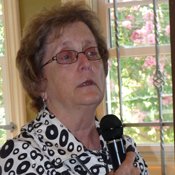Friday, June 24, 2011
Speaking at a community forum this morning, Mississippi Department of Health nurse Ann Jackson said that the state needs help from community members to address a high number tuberculosis cases in the Jackson metro, adding that African Americans account for two thirds of all TB cases in Hinds County.
"Here in the metro area, we have almost half of the total number cases of TB that we have found in ... the state of Mississippi," Jackson said at Konoinia Coffee House's Friday Forum. "We have to address this."
Last year, the state reported 116 TB cases. Coughing, sneezing or even speaking easily spreads tuberculosis. Often, the lung disease has no symptoms, but individuals must undergo treatment. TB is a highly contagious bacterial infection that spreads quickly.
Jackson said that two years ago the health department targeted the city's homeless population for treatment and since then the county's TB numbers have dropped. One reason affected individuals do not seek treatment is because of a misconception that TB is no longer a threatening disease, she said.
The state incurs the costs of treating individuals infected with TB. Shelters do not permit infected homeless men and women , and the Department of Health often houses them in hotel rooms from three weeks to six months while they receive medical care.
Jackson said that the state health department is targeting individuals in two Jackson zip codes: 39209 and 39203.
"The population (in Hinds County) is difficult to approach," she said. "We are finding some difficult areas that we need to overcome."
The state health department will host a community forum from 1 p.m. to 3 p.m. July 22, at the Arts Center of Mississippi.
Jackson said that one third of the world's population is infected with TB. The South has the highest number of cases in the United States.
"People don't understand that TB is still here," Jackson said. "It hasn't gone away."
For more information, call 1-866-458-4948.

Comments
Use the comment form below to begin a discussion about this content.
Sign in to comment
Or login with:
OpenID